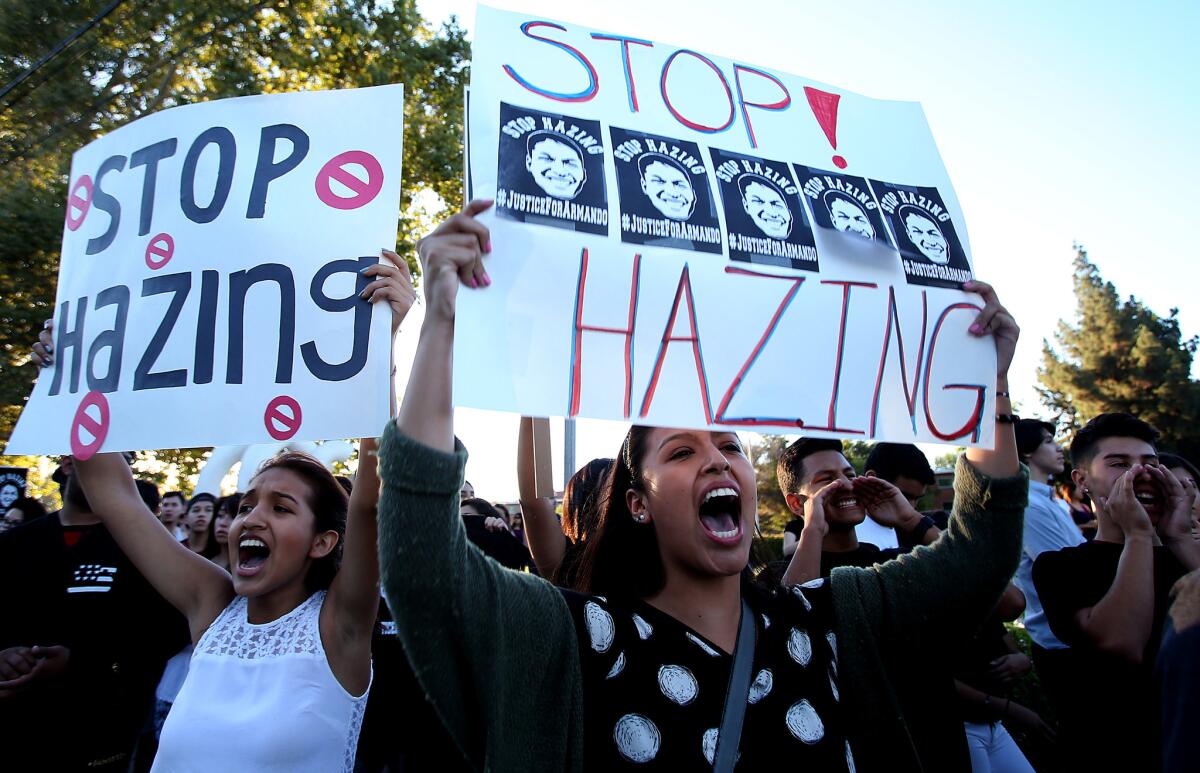Prosecutors decline to charge fraternity president in CSUN hazing death

Family and friends of Armando Villa, who died in a hazing incident, rally in July 2014 to call for an end to fraternity hazing at Cal State Northridge.
- Share via
The Los Angeles County district attorney’s office has declined to file charges against the president of a now-defunct fraternity in the death of a Cal State Northridge student who died during an alleged hazing incident last year.
Prosecutors ruled there was insufficient evidence to prove beyond a reasonable doubt that Alex Terzibachian’s actions were criminal, according to a charge evaluation document from the district attorney’s office. The decision means Terzibachian won’t be charged with hazing or involuntary manslaughter
At the time, Terzibachian was Pi Kappa Phi’s president. Armando Villa, 19, was pledging for Pi Kappa Phi, when he went on a hike July 1, 2014, in the Angeles National Forest, became dehydrated and died.
Prosecutors argued that choosing to hike on a hot day with inadequate water supplies does not amount to involuntary manslaughter.
“The pledges were not denied basic needs, such as water, shoes, clothing or sleep,” prosecutors said. “The events leading up to this victim’s death do not fit within the definition of ‘hazing.’”
Villa, prosecutors said, was allowed to choose his own clothing and shoes.
Hazing deaths, prosecutors said, are usually the result of excessive alcohol consumption, drugs or physical injury inflicted by fraternity members.
None of those examples led to Villa’s death, according to the court document.
In this case, Terzibachian and other fraternity members were participating in the same pledge activity, according to the document. No drugs or alcohol were permitted during the hike. The group, prosecutors said, stopped to eat hot dogs for lunch before they continued hiking.
Terzibachian, prosecutors say, provided Villa and the other pledges with individual water supplies. He also brought additional water for the hike. The pledges, however, ran out of water before the end of the hike.
The pledges told authorities that they didn’t realize Villa was suffering from heat exhaustion, or “was any worse off than the other hikers,” according to the court document. At one point, the pledges attended to another hiker who was exhibiting symptoms of dehydration and heat exhaustion.
Prosecutors said Villa ran away from the group without telling Terzibachian and any of the other pledges. They later found him lying face down in a culvert.
He was unconscious and unresponsive. Villa had a sunburn, blisters on his feet and some scratches that probably occurred during the hike, prosecutors said.
Attorney Douglas Aberle, who represents Villa’s parents, has argued that Villa was forced to wear ill-fitting shoes during the hazing. He said the fraternity leaders didn’t bring enough water, so Villa and a friend left the group in search of more water.
Villa’s parents are suing Pi Kappa Phi and the university over his death seeking unspecified damages. They argue that the university and fraternity’s conduct led to his death.
The fraternity has since shut the Cal State Northridge chapter down and is permanently banned from operating on the campus.
For breaking news in California, follow @VeronicaRochaLA
More to Read
Sign up for Essential California
The most important California stories and recommendations in your inbox every morning.
You may occasionally receive promotional content from the Los Angeles Times.













